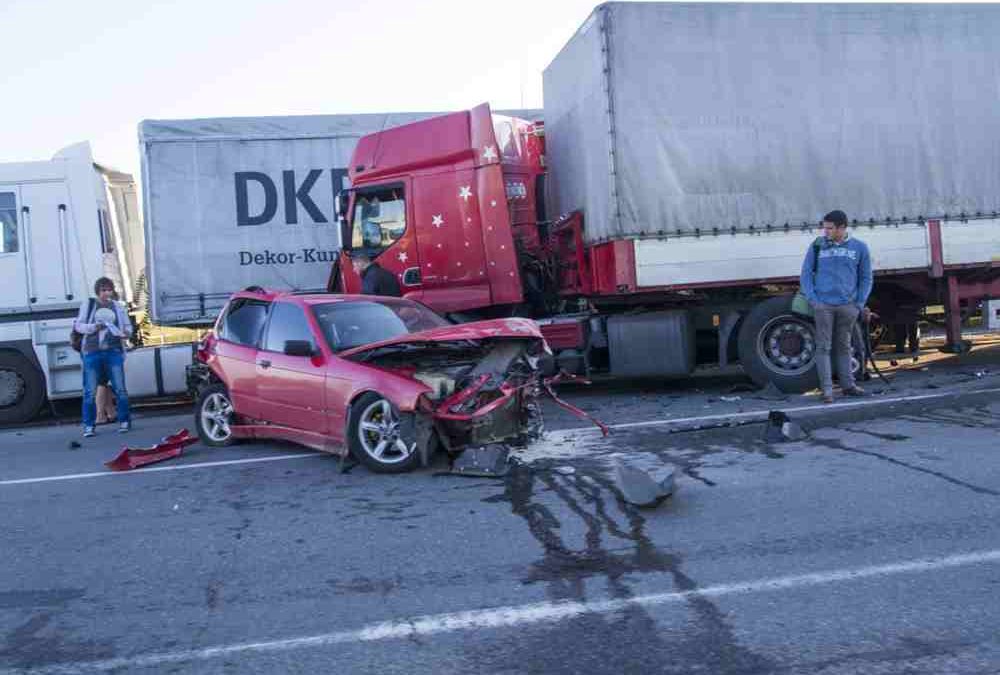Paradise’s busy corridors carry a steady stream of tractor‑trailers delivering goods to hotels, neighborhoods, and construction sites, and when a heavy rig collides with a passenger car, the consequences can be life‑altering. Victims often face a mix of physical pain, insurance pressure, and uncertainty about how to prove fault quickly enough to protect their rights. The goal of this guide is to clarify what causes these wrecks, what evidence matters most, and how to position a claim for fair compensation. You will also learn how employers can be held accountable and why legal strategy is critical in high‑value cases. If you have questions about next steps, firms like Cameron Law help people make sense of the legal and financial options after serious crashes, including those tied to Paradise Truck Accidents.
How Commercial Trucking Accidents Impact Paradise Motorists
A collision with a commercial truck is not a typical fender bender; the mass differential alone multiplies the energy transferred to a sedan, SUV, or motorcycle. Victims frequently report spine and joint injuries, traumatic brain injuries, and internal trauma, as well as emotional distress that complicates recovery and work. In a destination city, lane closures and cleanup operations from a single truck crash can ripple across major arteries, delaying emergency services and disrupting local businesses. Families often shoulder hidden expenses like childcare, transportation, and lost job opportunities while medical bills accumulate. In the wake of major Paradise Truck Accidents, these ripple effects can be felt not just by victims but by commuters and visitors who depend on reliable roadways.
Common injuries and cascading effects on daily life
Beyond emergency treatment, rehabilitation can stretch for months, and the return‑to‑work timeline becomes a moving target. Orthopedic surgeries, neurological evaluations, and specialized therapies often require strict adherence and travel, which can be exhausting and expensive. Psychological impacts like anxiety behind the wheel, nightmares, and hypervigilance are also common and may require counseling or medication to manage. The cascading effects extend to insurance hurdles, where policy exclusions, liability disputes, and medical lien negotiations consume time that victims would rather devote to healing. When the event involves Paradise Truck Accidents, local traffic patterns and tourism pressures can intensify the inconvenience, increasing stress on families already dealing with injury recovery.
Investigating Driver Fatigue, Cargo Overload, and Negligence
Serious truck crashes rarely stem from a single misstep; they often reflect a chain of preventable choices. Driver fatigue remains a leading factor, and violations of hours‑of‑service rules can be traced through electronic logging devices, toll receipts, and dispatch records. Improperly secured or overloaded cargo changes a truck’s handling, increases stopping distances, and raises rollover risk, particularly on tight ramps and wind‑prone corridors. Negligence can also include speeding, distracted driving, or failing to conduct pre‑trip inspections, all of which erode a truck’s safety margin. A disciplined investigation connects these dots so that liability is not merely alleged but demonstrated.
How fatigue, load, and negligence show up in evidence
Fatigue evidence may appear in patterns of log edits, improbable travel times, inconsistent fuel receipts, or gaps in rest documentation. Cargo problems can be proven through bills of lading, weight tickets, photographs of damaged or shifted freight, and testimony from loaders or warehouse staff. Negligence indicators include dashcam footage, brake inspection results, cell‑phone usage records, and roadside inspection histories. Investigators often cross‑reference telematics with GPS pings and engine control module data to align timelines and pinpoint maneuvers before impact. This mosaic of records, when properly preserved and analyzed, helps establish whether the driver’s conduct and freight practices made the collision foreseeable and preventable.
Employer Liability in Logistics and Freight-Related Collisions
When a commercial driver causes a crash during the course of employment, the employer can be responsible under vicarious liability doctrines. But liability often goes further: negligent hiring, training, supervision, and retention claims may attach if the company ignored red flags like prior violations or inadequate road testing. Some carriers push aggressive delivery schedules, incentivizing speed and driving through fatigue, which can support claims of systemic negligence. In other cases, gaps in fleet maintenance programs or inadequate safety audits create predictable risk, especially when a motor carrier expands faster than its compliance infrastructure. Holding the employer accountable ensures the financial resources match the severity of the injuries and long‑term needs.
Brokers, shippers, and rental fleets: when others share fault
Liability can extend beyond the motor carrier to freight brokers and shippers that contributed to unsafe conditions. A broker that disregards safety ratings or entrusts loads to a poorly vetted carrier may face claims for negligent selection or oversight. Shippers that load freight improperly, mislabel hazardous materials, or pressure tight schedules can be implicated when their choices contribute to instability or lost braking efficiency. Rental and leasing companies may share responsibility if they ignored maintenance defects or violated inspection requirements. A thorough legal strategy maps the full logistics chain, identifying every entity whose policies and decisions nudged the crash toward inevitability.
Key Evidence: Black Box Data and Maintenance Records
Modern heavy trucks generate a rich trail of electronic data that can reveal what really happened in the seconds before a collision. Engine control modules and event data recorders capture speed, throttle position, brake application, gear selection, and fault codes. Fleet telematics add breadcrumb trails of location data, sudden braking alerts, and driver behavior metrics. Complementing these are inspection documents and repair logs, which may show if brakes, tires, and steering components met safety standards. Together, these sources can validate or undermine driver accounts and help reconstruct the dynamics of the crash with precision.
Preserving and decoding electronic evidence
Immediate preservation is critical; letters demanding retention of electronic control module files, dashcam footage, and telematics prevent spoliation. Maintenance files should include driver vehicle inspection reports, work orders, parts invoices, and warranty claims that might hint at recurring defects. Competent reconstruction experts can synchronize telematics with physical evidence like skid marks, yaw patterns, and crush profiles to validate speed and steering inputs. Attorneys often subpoena dispatch notes, internal messages, and safety department emails that reveal company awareness of recurring maintenance or training issues. When a case arises from large‑scale incidents like Paradise Truck Accidents, methodical evidence handling ensures complex multi‑vehicle timelines remain reliable and credible.
Average Settlements for Catastrophic Truck Accident Injuries
Settlement values in catastrophic cases are highly fact‑specific, but a few principles guide realistic expectations. Large commercial policies and excess insurance can expand the recovery ceiling, yet insurers still contest liability, causation, and the scope of damages. Life care plans quantify long‑term medical needs, from adaptive equipment to attendant care, while vocational experts assess lost earning capacity. Jurisdictional factors like jury tendencies and judicial case management also influence outcomes, as do liens from health insurers or government programs. Firms such as Cameron Law help clients navigate these variables and avoid undervaluation that can occur when adjusters move quickly to close files.
Variables that shape settlement values
- Liability clarity: strong evidence of rule violations, fatigue, or maintenance neglect typically increases leverage.
- Injury severity: traumatic brain injury, spinal cord damage, amputations, and complex orthopedic trauma drive long‑term costs.
- Economic losses: documented wage loss, diminished earning capacity, and future care projections anchor negotiations.
- Non‑economic harm: pain, suffering, and loss of enjoyment must be supported by consistent medical narratives and testimony.
- Policy structure: primary and umbrella/excess layers, plus potential corporate assets, frame the realistic upper bounds.
Even with these anchors, timing matters. Early offers rarely reflect the full arc of recovery, especially before maximum medical improvement clarifies future needs. Seasoned negotiators test theories of liability against the evidence and calibrate demand packages to demonstrate risk to the defense. Structured settlements or special needs trusts may also optimize tax treatment and protect eligibility for public benefits. Clear communication about options helps families choose paths that align with both immediate expenses and long‑term stability.
Emotional and Financial Recovery Options for Victims’ Families
Truck collisions do not only injure bodies; they can strain relationships, create caregiver burnout, and disrupt daily routines. Families often juggle hospital visits, work obligations, and school schedules while learning new medical terminology and care protocols. Accessing counseling, peer support groups, and trauma‑informed therapy can make coping more manageable and reduce long‑term psychological harm. Insurance matters often add stress, from coordinating medical benefits to fielding recorded statements. After serious events, including those linked to Paradise Truck Accidents, centering the family’s well‑being alongside the legal strategy prevents avoidable setbacks.
Resources that help families stabilize
Wrongful death and survival claims can address funeral expenses, loss of financial support, and the decedent’s pre‑death pain and suffering, where applicable. Loss of consortium claims recognize the real impact that severe injuries have on partners and children, including the loss of companionship and household services. Social workers, hospital patient advocates, and nonprofit organizations often help with applications for disability benefits, transportation vouchers, or temporary housing. Financial planners can model long‑term budgets, integrating expected settlements with college savings, mortgage obligations, and retirement needs. When a case stems from Paradise Truck Accidents, community resources and local care networks can reduce travel demands and accelerate access to qualified specialists.
The Importance of Skilled Legal Counsel in High-Value Claims
High‑stakes trucking cases combine federal motor carrier regulations, complex medical issues, and aggressive defense tactics. Carriers and insurers frequently mobilize rapid response teams within hours to shape the narrative, making early investigation on the plaintiff’s side essential. Skilled counsel knows how to secure black box data, send preservation letters, and retain reconstruction experts before critical evidence disappears. They also anticipate defenses, from comparative negligence arguments to disputes over causation, and build case themes that resonate with mediators and juries. With guidance from a seasoned team like Cameron Law, victims can move from reactive scrambling to proactive case building.
What top-tier representation looks like
Top practitioners coordinate a multidisciplinary approach: medical experts to define prognosis, economists to translate losses into numbers, and trucking safety specialists to unpack regulatory violations. They maintain a clear cadence of communication so clients know what to expect at each stage, from demand packages through mediation and, if necessary, trial. Effective negotiators present damages with clarity—using day‑in‑the‑life visuals, demonstrative timelines, and authenticated records—to convert complex facts into compelling stories. They also manage liens and subrogation claims to maximize net recovery, not just the top‑line settlement number. For families navigating the aftermath of Paradise Truck Accidents, choosing counsel with a track record in commercial vehicle litigation can be the difference between a rushed, inadequate payout and a recovery that truly funds long‑term care and stability.



